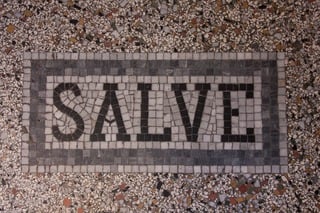Learning Latin: What’s in it for Me?
People say that Latin is a dead language, yet somehow it appears everywhere. We use it daily, without even thinking, and it’s at the root of many words, phrases and sentence structures. Not only is it handy for solving crosswords, spelling, understanding languages other than just English and even when working out answers for quizzes or standardised tests. Quid sum ego de? Latin is the answer.
As we grow up, teachers and professors tell us that Latin is crucial, but when you consider taking it, you’re told that it’s worthless since it’s dead. As much of a conundrum as this is, the question still remains: should you learn Latin? Do you need to learn Latin? What would be the benefit and how does one go about learning it?

Photo via Pixabay
Latin gave me life (true story)
Now there’s a profound statement (profound, from the Latin ‘profundus’ meaning deep).
In 1928 my father, at just eight years old, began school at an orphanage in Cork city. Dad endured a lot of hardship, yet he never spoke of it until telling me in 2008, when he was literally on his deathbed. He told me that he was a good student, especially at Latin. Where he succeeded in language, he unfortunately failed at maths and in 1936, after a bit of a kerfuffle with his teacher and a student in the classroom, Dad was expelled and sent home. His mother didn’t want him, as she couldn’t afford another mouth to feed. Secondary school education was expensive and, quite frankly, out of the question. However, being the good Latin student that he was, the local Presentation Brothers admitted him on a scholarship.
Long story short: Dad got to finish school and did so well that he was able to join the army as a cadet. A few years later, he met and married a local girl and, as fate would have it, along I came in 1966. Without his skills at Latin, he may not have stayed around and who knows what would have become of me.
Repaying the debt
So in a way, I’ve felt that I owe my life to Latin and so I figured maybe I should consider repaying the debt. What better way to give a dead language life than by learning it and trying to use it? Teaching yourself a language from scratch isn’t easy, but Latin isn’t very foreign to English speakers. The big problem here is that so few people speak Latin these days. If I learn Latin, will I become a whiz at spelling, crosswords and quizzes? Maybe so, but really, where does that leave me? What can I do with it?
Interested in learning Latin or another language? Send us an enquiry today!
What are the benefits then?
Benefit, from the Latin bene factum, meaning good deed.
My father would often tell me a word’s origin, such as animal from the Latin anima meaning breath, life or soul, and then go on to explain what an unknown word could mean. Cross-pollination happens in languages all the time and knowing the root of a word can only help when learning another tongue to speak. Latin can help, too, with the spelling and understanding of a word, though English is so full of exceptions this may not always be the most obvious benefit. Today, science is where having a basic knowledge of Latin is the greatest benefit, particularly in medicine, chemistry and biology. However, even if you’re not going into the medical/science field, Latin is still another language; the benefits of which serve as the basis for shaping perspective and understanding the world through a different lens.

Photo via PxHere
Lost in translation
Speaking a language isn’t the only way to be proficient in one, and oftentimes, reading can bring as much pleasure as engaging in conversation. In our English-speaking world we miss out on so much good literature because it is in a foreign language; by relying on a translation we are relying too on another person’s interpretation. Learning Latin means I could be opening myself to a whole world of unread classics, as is true for any foreign language. Italian gives me Ferrante; French has Patrick Modiano, German Goethe, and so on.
Quo modo?
Okay, so Latin as we once knew it hasn’t really changed at all in comparison to where it is today and more than likely will continue to simply be preserved in the future. It is the language of the Holy See/the Catholic church and Latin Wikipedia has 100,000 entries. The pervasive question is still though, is it important to learn Latin? Eh. Should you still learn it? Eh. Would it be bad if you did? Absolutely not.
